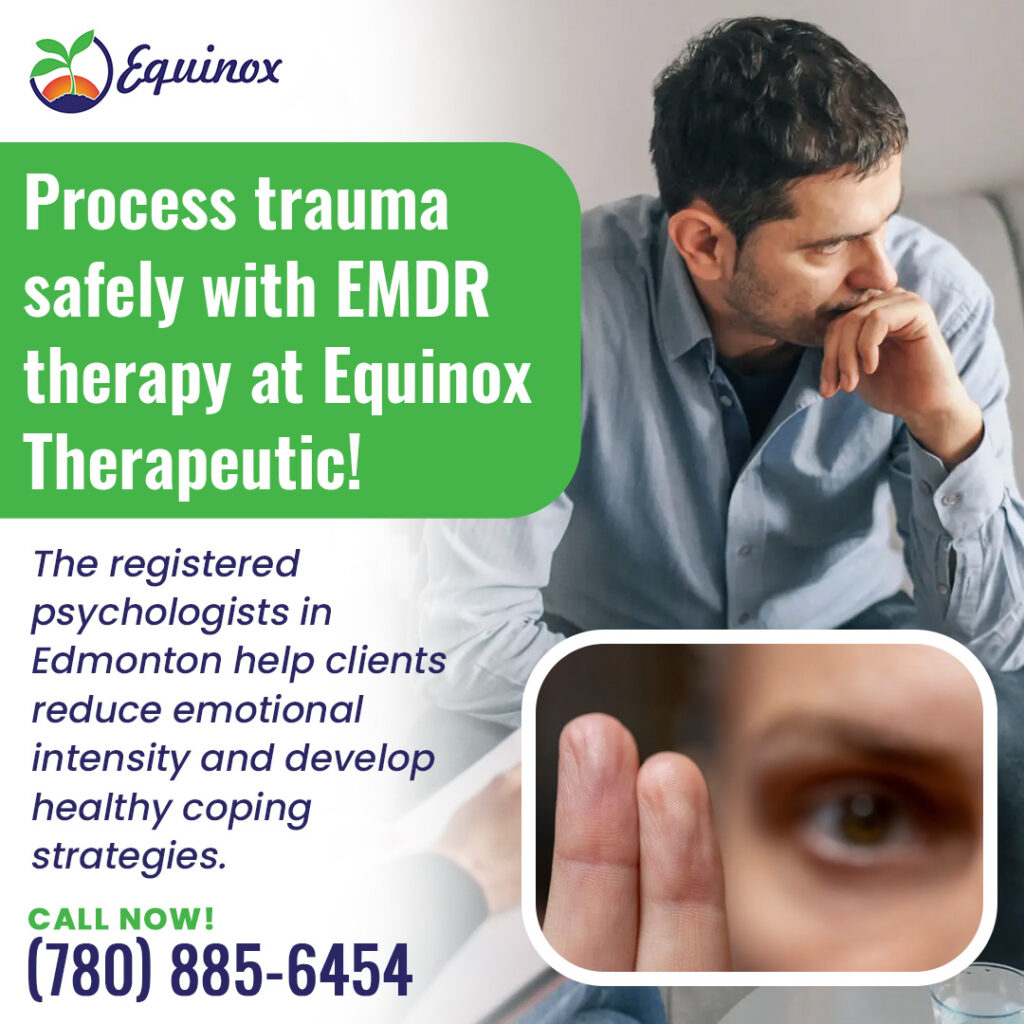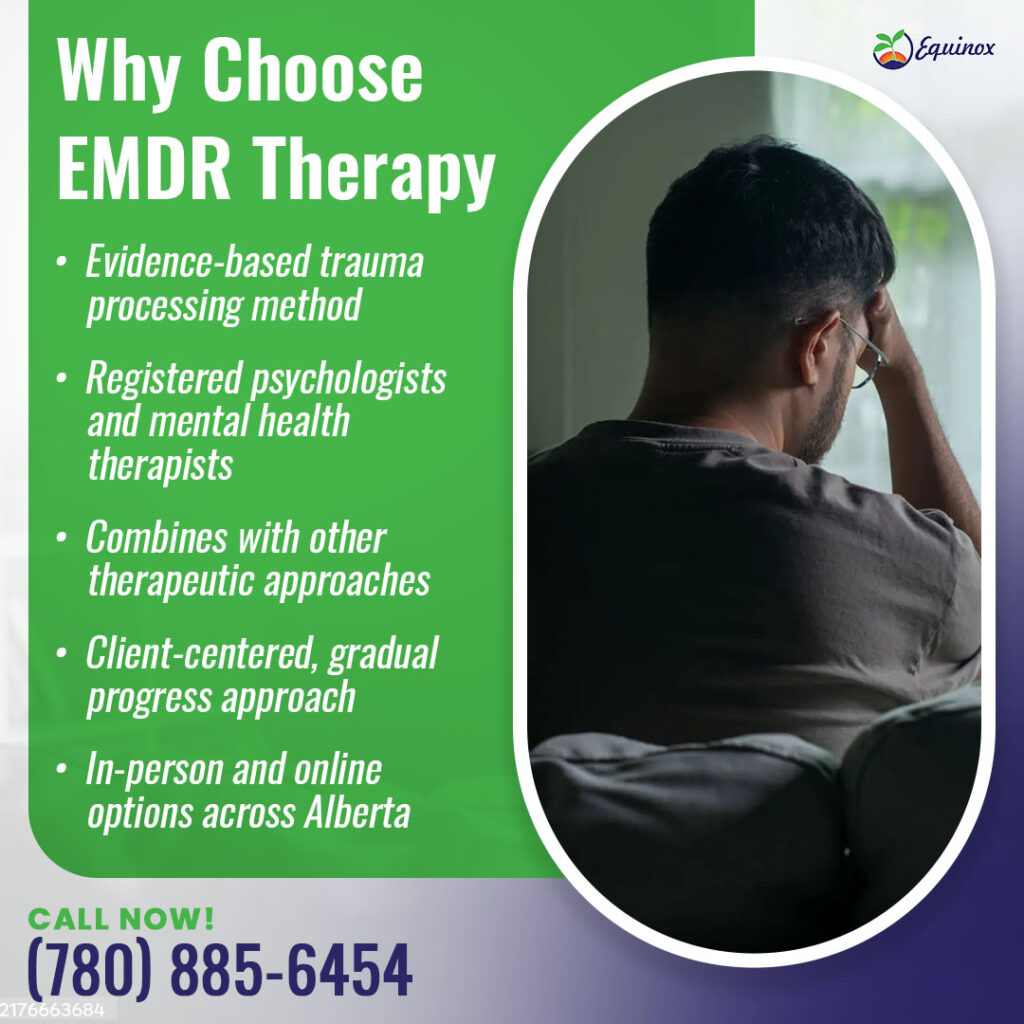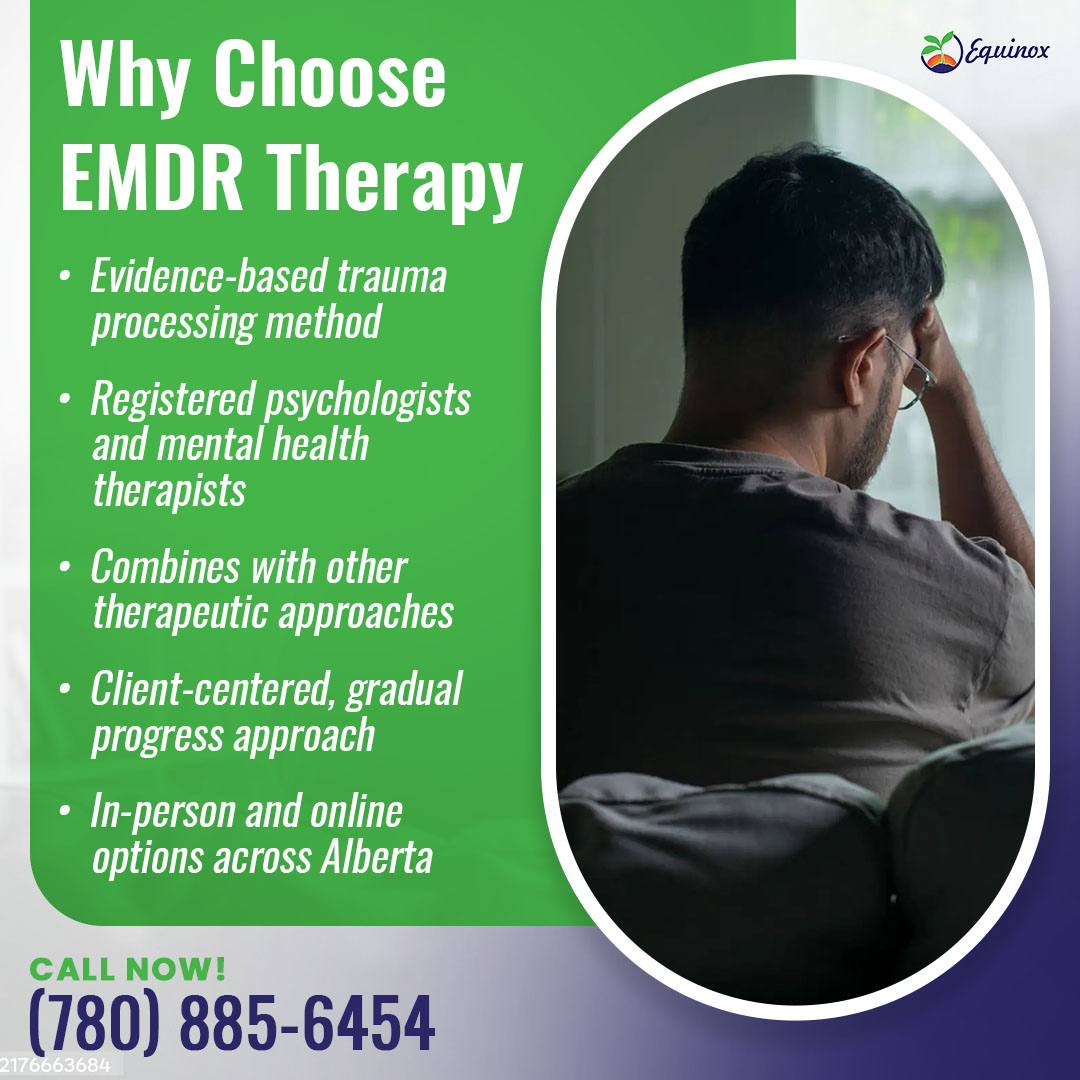Equinox Therapeutic And Consulting Services provides professional support for individuals seeking trauma-focused care. Our team of registered psychologists and mental health therapists offers evidence-informed approaches, including EMDR (Eye Movement Desensitization and Reprocessing), to help clients process distressing memories and develop coping strategies.
Trauma can impact emotional well-being, relationships, and daily life. EMDR therapy, as applied by our Edmonton-based trauma psychologists, may assist clients in managing symptoms of anxiety, depression, or post-traumatic stress. Combined with other supportive therapeutic methods, it can be part of a structured approach to promote emotional stability and gradual recovery.
An Introduction to EMDR Therapy
EMDR therapy is a method that many individuals find helpful when addressing the lasting effects of trauma. It provides a structured framework for processing difficult experiences, and many people notice shifts in how they relate to past events. Here, we will explore what EMDR involves and how it is applied in clinical practice by trauma psychologists in Edmonton.
What is EMDR?
EMDR (Eye Movement Desensitization and Reprocessing) is a structured therapy used to help clients process traumatic memories. Developed by Francine Shapiro in the 1980s, it was initially used to support individuals experiencing post-traumatic stress disorder (PTSD). Over time, its applications have expanded to include anxiety, depression, and other trauma-related challenges.
During EMDR, you are guided to recall specific memories while simultaneously focusing on bilateral stimulation, such as eye movements, auditory tones, or gentle tapping. This process allows the mind to gradually work through memories that may feel overwhelming, helping emotional reactions to become less intense.
Many people who work with a trauma psychologist in Edmonton find that EMDR provides a fresh perspective on past experiences. It can also complement other forms of trauma therapy in Edmonton, giving you additional tools to explore emotions, manage stress, and gain insight into recurring patterns.

How EMDR Is Applied in Clinical Settings
EMDR uses bilateral stimulation, such as guided eye movements, auditory tones, or gentle tapping, while recalling trauma. In a clinical session, your therapist in Edmonton or trauma counsellor in Edmonton will guide you through the process carefully, creating a supportive and safe environment.
The stimulation is paced according to your comfort level, which allows your mind to process memories that may have been stuck or unresolved. Sessions are organized in structured phases, beginning with preparation and grounding exercises, followed by memory processing, and ending with reflection and closure. Each phase is designed to help you engage with memories thoughtfully while noticing changes in emotional intensity over time.
Many clients report that participating in EMDR sessions has helped them feel more in control of their responses to triggers and supported their ability to cope with daily challenges. While individual experiences differ, EMDR can be part of a broader plan that includes other therapies or counselling approaches, creating an extensive and personalized path for managing trauma and improving emotional well-being.
Trauma and Its Effects on Mental Health
Trauma can influence emotional well-being, relationships, and everyday functioning in ways that may feel overwhelming. Recognizing how trauma manifests and seeking guidance from a therapist in Edmonton can be an important step toward managing its effects and supporting recovery.
Understanding Trauma Responses
Trauma can result from a single event, repeated experiences, or prolonged stress. Individuals who experience trauma often notice intrusive thoughts, strong emotional reactions, difficulty concentrating, or emotional numbing. These responses can affect your ability to perform daily tasks, maintain relationships, and cope with stress.
Working with a trauma psychologist in Edmonton can help you identify these reactions and explore strategies for responding to them in a safe and controlled way. By acknowledging how your body and mind react to stressors, you can begin to recognize patterns and develop methods for managing emotional intensity, gradually regaining a sense of stability.
Common Challenges in Trauma Recovery
Recovering from trauma often involves addressing symptoms such as anxiety, depression, or post-traumatic stress. Engaging in trauma therapy in Edmonton or trauma counselling in Edmonton provides a structured space to explore these challenges and practice coping strategies. Sessions may focus on improving emotional regulation, processing difficult experiences, and learning healthy ways to respond to triggers.
Every individual’s experience is unique, and your therapist in Edmonton will tailor interventions to your personal needs, helping you work at a pace that aligns with your comfort level. Over time, these approaches aim to support your resilience and assist in returning to daily activities with greater confidence and emotional balance.
The Function of EMDR in Trauma Counselling
EMDR therapy can serve as a structured approach to addressing the effects of trauma. Many clients find that it provides a way to process challenging memories while supporting overall mental health. Here, we will discuss how EMDR sessions work and the ways they can complement other therapeutic supports for individuals seeking trauma-focused care.
Processing Traumatic Memories
EMDR may help clients process distressing memories safely. During a session, a trauma psychologist in Edmonton will guide you through recalling specific events while introducing bilateral stimulation, such as eye movements, auditory tones, or gentle tapping. This method is structured to allow you to revisit memories in a controlled and supportive environment, which can help your mind respond with less intensity and allow emotions to become more manageable.
By working closely with a therapist in Edmonton, you can explore ways to understand and reflect on unresolved memories. This process often involves noticing emotional and physical reactions, identifying patterns, and gradually reducing the distress associated with past events. Over time, these sessions can help you regain a sense of balance and make it easier to navigate daily life without feeling overwhelmed by traumatic memories.
Supporting Broader Mental Health Goals
EMDR may complement other therapies in managing anxiety, depression, or PTSD. Each person’s experience with trauma is unique, and integrating EMDR with trauma therapy in Edmonton or other counselling approaches can provide additional support. Sessions often focus on building coping strategies, recognizing triggers, and practicing skills for emotional regulation.
Trauma counselling in Edmonton can help adapt the therapy plan to your individual needs, emphasizing the areas most relevant to your personal situation. By combining EMDR with supportive interventions, clients often feel better equipped to manage daily stressors, improve resilience, and address challenges in relationships or work. While outcomes vary, the structured nature of EMDR allows for careful exploration of difficult experiences in a way that respects your pace and comfort.
Integrating EMDR with Other Therapeutic Supports
EMDR therapy often works best as part of a broader approach to trauma recovery. When combined with other therapeutic methods, it can provide a more extensive framework for addressing the emotional, cognitive, and behavioural impacts of trauma.
Complementary Approaches in Trauma Recovery
CBT or acceptance-based therapy may be combined with EMDR. Many clients who work with a trauma psychologist in Edmonton find that using these approaches together provides multiple ways to manage symptoms such as anxiety, depression, or stress.
Cognitive-behavioural therapy helps identify and adjust thought patterns that may contribute to emotional distress, while acceptance-based strategies support acknowledging emotions without judgment. Integrating these approaches with EMDR allows you to explore thoughts, feelings, and behaviours in a structured way, addressing different aspects of trauma simultaneously.
A therapist in Edmonton can help guide this combination, adjusting techniques to match your experiences, preferences, and goals. This collaborative process gives you opportunities to experiment with strategies, practice coping skills, and notice changes in how you respond to challenges over time.
Personalized Therapy Pathways
Therapy plans are tailored to individual needs. Trauma counselling in Edmonton considers factors such as the type of trauma you have experienced, your readiness for specific techniques, and any prior experiences with therapy. This allows sessions to progress at a pace that feels manageable while focusing on the challenges most relevant to you.
Personalized therapy pathways also provide flexibility, so approaches can be adjusted as your comfort and understanding evolve. Through ongoing collaboration with your therapist, EMDR and complementary methods are applied in a thoughtful, structured way, helping you gradually process memories, manage emotional responses, and develop practical strategies for daily life.
Equinox Therapeutic’s Role in Trauma Recovery
Equinox Therapeutic And Consulting Services plays an active role in supporting individuals dealing with trauma. With a team of registered psychologists and therapists, we offer evidence-informed services designed to address the emotional, cognitive, and behavioural impacts of trauma.
Professional Services and Clinical Support
Equinox Therapeutic And Consulting Services provides registered psychologists and therapists offering trauma therapy, EMDR, and counselling in Edmonton. Each clinician works with you to explore your experiences in a structured and supportive environment.
By combining EMDR with other therapeutic techniques, our trauma psychologist in Edmonton or therapist in Edmonton can assist in processing distressing memories, managing anxiety or depression, and developing coping strategies.
The focus is always on client-centred care, allowing sessions to be adapted to your unique needs and comfort level. Whether addressing single-incident trauma or more complex, ongoing experiences, our clinicians at Equinox Therapeutic And Consulting Services guide you through a thoughtful process aimed at gradual understanding and emotional regulation.

Accessible Care Options
Clients can attend in-person sessions or access online therapy across Alberta. This flexibility allows you to choose the option that best fits your schedule, location, and personal preferences.
Online sessions provide an opportunity to engage in trauma counselling in Edmonton from home while maintaining the same level of professional support and guidance as in-person care. By offering multiple avenues for therapy, we make it easier for individuals to begin or continue their recovery process without logistical barriers interfering with progress.
Commitment to Safety and Gradual Progress
Our therapists prioritize safety, comfort, and pacing. Each session is designed to support measured progress, giving you space to process experiences at your own pace. Reflection and feedback are incorporated into sessions, allowing you to identify changes in emotional responses and gradually build resilience.
Our trauma counsellor in Edmonton works collaboratively with you to adjust approaches over time. This creates a supportive environment where recovery is approached thoughtfully, respectfully, and with attention to individual needs.
Take the Next Step in Your Healing Journey!
At Equinox Therapeutic And Consulting Services, our team is ready to support you through trauma therapy, EMDR, and counselling in Edmonton. If you are looking to explore strategies for coping with past experiences or need guidance on managing emotional challenges, we are here to help.
You can schedule a consultation or reach out with any questions by contacting us at (780) 885-6454 or email [email protected]. Begin your journey toward greater emotional balance and well-being today with personalized support tailored to your needs.



